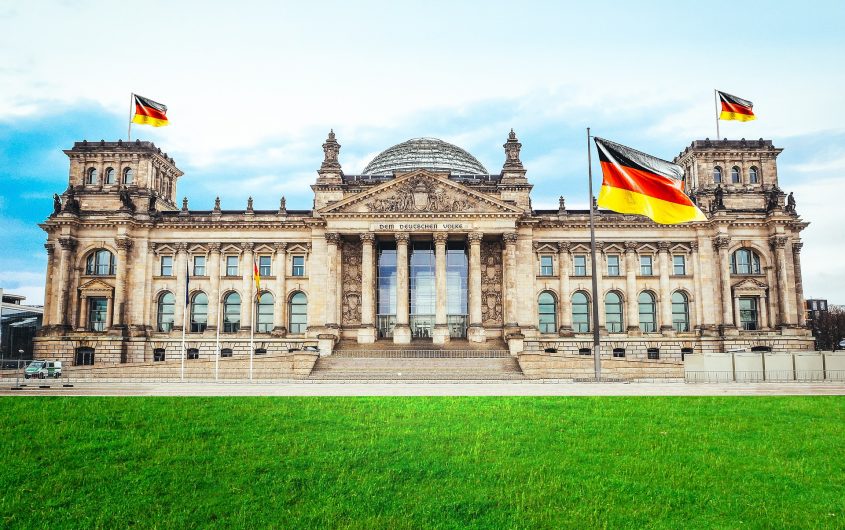
via Pixabay
What Follows from Germany’s National Security Strategy?

James D. Bindenagel
University of Bonn
James D. Bindenagel is a retired U.S. Ambassador, Henry-Kissinger-Professor (Emeritus) at Bonn University, and Senior Non-Resident Transatlantic Fellow at the German Marshall Fund of the United States. He has published: Germany: From Peace to Power? Can Germany Lead in Europe without Dominating it? (2020) and International Sicherheit im 21. Jahrhundert, Deutschlands Verantwortung (2015), both published by V&R Bonn for Bonn University.

Thomas Risse
Freie Universität Berlin
Thomas Risse was a Professor of International Politics at the Otto Suhr Institute of Freie Universität Berlin and is now a Senior Professor at the Cluster of Excellence "Contestations of the Liberal Script" (SCRIPTS) at Freie Universität Berlin.
Strategic Foreign Policy Toward Russia, China, and Transatlantic Relations
Russia’s war against Ukraine highlighted the epochal turning point in German foreign policy, which Olaf Scholz called a Zeitenwende. Germany has only succeeded in freeing itself from the blackmail potential of Russian energy supplies while facing a Russian military threat. Consequently, Olaf Scholz declared the Russian invasion of Ukraine the end of the post-cold War era. Yet, more than a year after this speech and after countless other lectures and conferences, the consequences of the turning point for Germany remain unclear.
Germany’s first National Security Strategy, published on June 14, 2023, represents a step in the right direction, although it repeats the familiar at many points. The Strategy includes, among other things, the commitment to meet the goal of spending 2 percent of GDP on defense. The National Security Strategy is a good start for strategic thinking, which Germany primarily deferred to NATO and the European Union after the end of the Cold War. The Russian war of aggression against Ukraine acted as a catalyst to change the political culture of strategic thinking.
While the National Security Strategy defines German interests and expands the definition of integrated security, it fails to set priorities and strategies for addressing security challenges. In particular, the task now must be to formulate alternatives for Germany’s strategic dependencies: economically on cheap Russian fossil fuels, exports to and investments in China, and American security guarantees. In this regard, deliberations on alternatives to Russian energy are most advanced, and the China strategy of July 13, 2023, clarified the relationship with East Asia, at least to some extent. On the future of transatlantic relations, the German government has had little to say beyond the tried and true familiar statements.
Plans, as President Eisenhower said, are worthless; planning is everything. Strategic thinking helps to avoid blindly plunging into crises and helps to secure paths to peace in the future. With this in mind, we discuss below the priorities for tackling the major tasks regarding future relations with Russia, China, and the United States in the European Alliance.
Russia and the Eastern European region
The National Security Strategy clearly states that today’s Russia is “the greatest threat to peace and security in the Euro-Atlantic area for the foreseeable future.” This threat remains valid as long as an autocratic regime with imperialist, great-power ambitions rules in Russia, which does not care about principles of international law and questions the territorial integrity of its neighbors. There can be no (more) “common security” with this Russia; that is the categorical difference between the Cold War and today’s hot war in Europe. The former Soviet Union was a status quo power with which cooperation was possible. But Putin’s imperialist great power politics and a Western détente are mutually exclusive. The weakness of the Putin regime, which became apparent during the attempted coup by Yevgeny Prigozhin’s Wagner troops, does not change this assessment. On the contrary, the West must now support the Ukrainian counteroffensive with concrete steps toward NATO membership to make it clear to the rulers in the Kremlin that Putin’s adventurism is doomed to failure.
Many people ask how the war against Ukraine can end and how a politically sustainable peace is possible. Some U.S. analysts are currently making the same mistakes as made in the 1990s concerning the post-Yugoslav wars, in the 2000s concerning the “frozen conflicts” in the Southern Caucasus, and in 2014 about Russia’s invasion of the Crimea and the Donbas. That is, they advocate ceasefires without considering the long-term effects on peace and security in the region. They should be aware of the dangers of premature negotiations.
The Russian war of aggression against Ukraine acted as a catalyst to change the political culture of strategic thinking.
However, there will be no peace with Russia as long as an imperialist regime is in power in Moscow. As a result, the West must continue supporting Ukraine to achieve a resounding victory through its counteroffensive. Only then can a ceasefire be reached, and it has to be backed up by explicit Western security guarantees for Ukraine (and Moldova and Georgia). The best and least costly security guarantee would have been Ukraine’s early NATO accession. Unfortunately, the recent NATO Vilnius summit was disappointing since President Biden and Chancellor Scholz stated Ukraine could join NATO only after the war ends. Those in the United States and in Germany who reject early NATO membership for Ukraine out of consideration for Russia or fear of further escalation must be aware that the alternative can only be: a no-fly zone over Ukraine secured by NATO (or EU units), Western rapid reaction units in Poland and the Baltic states, which can intervene in military events in Ukraine at any time. The autocratic Russian leadership must know: The next aggression against Russia’s neighboring NATO states will lead to a war, which no one wants.
An early NATO accession of Ukraine would have had another advantage from the German and European points of view: In this case, the security dimension of an EU accession of Ukraine would recede into the background. Instead, the EU could concentrate on economic reconstruction and promoting the rule of law in Ukraine to help the country become “fit for the EU.” Corruption remains a huge problem in Ukraine.
Relationship with China
The recently published German China Strategy spells out in more detail what it means that China is a “partner, competitor, and systemic rival.” It also acknowledges that the “elements of rivalry and competition” have increased in recent years because of China’s behavior. So far, so good!
China, unlike Russia, which is fighting its decline as a world power with all autocratic means and employing military aggression, is an emerging world power. China’s relationship with the rule-based world order built on liberal principles is ambivalent, even under Xi Jinping’s increasingly repressive leadership. China has benefited enormously from the open global economic order, and little will change in the future. However, the German concept of “change through trade” (Wandel durch Handel) has long since failed. Germany, the EU, and China have common interests in maintaining an open world economic order. China remains Germany’s and the EU’s largest trading partner, so decoupling the German and European economies from China would have devastating consequences for the German economy. The China Strategy spells out to some extent what “de-risking” means. However, it does not identify clear “red lines” for German companies, which they can rightly expect.
While there will be a mixture of conflict and cooperation in German-Chinese economic relations, international human rights as part of the liberal world order is an area where the different values of liberal democracies and autocratic regimes clash: From a German and European perspective, there can be no compromises on human rights if Europeans do not want to give up their principles and values. There is no point in being soft on China in this area; on the contrary, the world will not take Europe seriously. Here, Foreign Minister Annalena Baerbock has shown how to gain respect in China by clearly stating German interests.
Germany must also position itself within the European alliance regarding China’s territorial ambitions. This concerns, first and foremost, Taiwan, but also the various territorial disputes in the East and South China Seas. Germany too often gives the impression of leaving territorial integrity issues to the United States. This reticence contradicts German economic, security, and human rights interests and values. Germany must be clear that a Chinese invasion of Taiwan will have a catastrophic impact on the world economy, especially on European economies, because it will disrupt supply chains far more massively than during the COVID-19 pandemic.
China’s attitude to urgent global political issues, such as international climate policy, is also ambivalent. Multiple analyses of Chinese politics repeatedly show that the survival instinct of autocratic regimes determines how China behaves on the international stage. Whenever the rule of the Xi Jinping regime is in question, China will shift its global policies to take maximum advantage. There can be selective cooperation for German foreign policy if the Chinese leadership keeps its promises.
Transatlantic relations and the EU
While the National Security Strategy finds clear words about Russia and the China Strategy clarifies Germany’s approach to Beijing, the transatlantic relationship must be reaffirmed. Instead, the National Security Strategy repeats familiar positions of simultaneous commitment to NATO and the EU (sowohl als auch). But here, too, the Zeitenwende must have consequences for Germany. Domestic polarization in the United States is not over. In the coming years, it will impact the United States’ role as the world’s leading power, regardless of who wins the 2024 U.S. presidential election. The days are irrevocably over when Europe and Germany could outsource their security to the United States. This dependence immediately affects the EU, the European pillar in NATO, and Germany.
Consequently, it is time to transform European national defense procurement to EU/NATO standards for consolidated European arms manufacturing. With so many weapons and ammunition stocks depleted in defense of Ukraine, there is now a unique opportunity to address a common European defense policy and arms procurement. Of course, the EU must replenish the most urgent and critical weapons systems and ammunition sent to Ukraine to fight Russia’s criminal aggression against Ukraine. However, competing national arms systems and production fragmentation undermines European security and diplomacy.
The days are irrevocably over when Europe and Germany could outsource their security to the United States.
The first step is the efficient joint development of military capabilities to interoperable systems and NATO standards. Ensuring a viable defense industrial base for EU Member States is enhanced by avoiding national duplication. Standard, interoperable weapons systems and ammunition are crucial for an effective and capable NATO and EU security and defense policy. Scholz’s €100 billion special fund for the Bundeswehr is available to help set such standards, which could help set EU standards for national rearmament and launch such weapons standardization for Europe. Such decisions could also address President Macron’s call for strategic autonomy as a strengthened deterrence with Europe’s security and defense pillar of NATO.
In this context, the EU Commission has stepped up and proposed a regulation establishing the European Defense Industry Reinforcement through the Common Procurement Act (EDIRPA) to create a standard defense procurement instrument that would fill the most urgent and critical gaps in EU defense capabilities and create incentives for EU member states to procure defense equipment jointly. The Commission established a €500 million common procurement fund, and together with the European Defense Fund in the EU budget from 2022 to 2024, can develop an instrument that will incentivize the joint procurement of defense capabilities by Member States. Such consolidation can facilitate access by all Member States to urgently needed defense equipment and allow European firms to foster international arms export competition. The €500 million fund is modeled on the multi-year financial framework (MFF) for the COVID-19 pandemic, which Chancellor Scholz supported during his time as German finance minister. The goal for greater deterrence should be to avoid national duplication of different weapons systems.
Zeitenwende and the future of the liberal world order
Germany in the EU should set priorities to develop strategies concerning the three dependencies described above, a prerequisite for its global diplomatic offensive. Solidarity among EU and NATO members is crucial to prevent the next war in Europe. In addition, Germany must align its interests with its partners’ interests in Japan, South Korea, Australia, New Zealand, and Canada.
Moreover, it will be crucial for the future of the rules-based world order to enter into a dialogue with countries of the Global South in Latin America, Africa, and Asia. German policy must be clear on what is at stake if Russia’s imperial fantasies or China’s aggressive stance in East Asia carry the day, let alone their horrendous human rights violations. Two-thirds of UN members condemned the Ukraine invasion in the UN General Assembly. At the same time, however, important countries and partners such as Brazil and South Africa abstained, not to mention India, which under Modi has its own problems with authoritarian populism. A rules-based world order that ensures the territorial integrity of countries and the protection of collective self-determination is in the supreme interest of Latin America, Africa, and Asia. It is one thing to—rightfully—accuse Western states of double standards. It is quite different to return to a “dog eat dog” world where the power of the mighty reigns. The rules-based liberal world order will only survive if it permanently convinces a majority outside the “West” that it is in their best interest. This diplomatic effort also requires the EU and Germany to renounce paternalism toward the Global South and be prepared to follow their values with deeds. Above all, patient diplomacy is needed.









